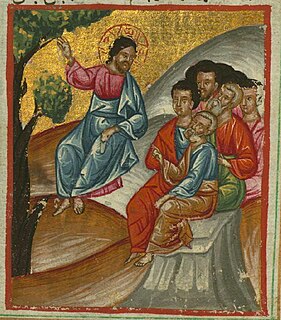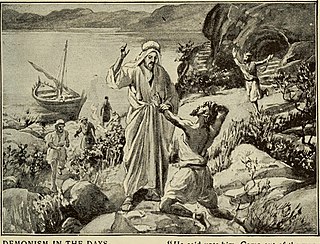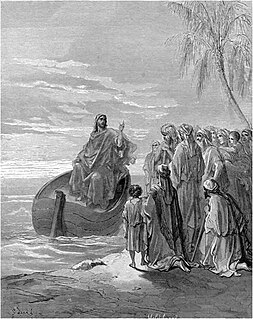Related Research Articles

Matthew 5:1 and Matthew 5:2 are the first two verses of the fifth chapter of the Gospel of Matthew in the New Testament. The verses introduce the Sermon on the Mount that will be recited in the next several chapters. The previous chapter concluded with large crowds "from Galilee, and from the Decapolis, Jerusalem, Judea, and beyond the Jordan" who followed Jesus to witness him healing: these verses present Jesus as seeing the crowds and going up onto a mountain to begin teaching.

Matthew 5:39 is the thirty-ninth verse of the fifth chapter of the Gospel of Matthew in the New Testament and is part of the Sermon on the Mount. This is the second verse of the antithesis on the command: "eye for an eye". In one of the most famous verses in the New Testament, Jesus here rejects revenge and retaliation, instead telling his followers to turn the other cheek.

Matthew 6:33 is the thirty-third verse of the sixth chapter of the Gospel of Matthew in the New Testament and is part of the Sermon on the Mount. This verse continues the discussion of worry about material provisions.

The Parable of the Tares or Weeds is a parable of Jesus which appears in Matthew 13:24–43. The parable relates how servants eager to pull up weeds were warned that in so doing they would root out the wheat as well and were told to let both grow together until the harvest. Later in Matthew, the weeds are identified with "the children of the evil one", the wheat with "the children of the Kingdom", and the harvest with "the end of the age". A shorter, compressed version of the parable is found without any interpretation in the apocryphal Gospel of Thomas.

Matthew 11:7 is the seventh verse in the eleventh chapter of the Gospel of Matthew in the New Testament.
Matthew 9:28 is a verse in the ninth chapter of the Gospel of Matthew in the New Testament.

Matthew 8:10 is the tenth verse of the eighth chapter of the Gospel of Matthew in the New Testament. This verse continues the miracle story of healing the centurion's servant, the second of a series of miracles in Matthew.
Matthew 9:17 is a verse in the ninth chapter of the Gospel of Matthew in the New Testament.

Matthew 12:3 is the third verse in the twelfth chapter of the Gospel of Matthew in the New Testament.

Matthew 8:18 is the 18th verse in the eighth chapter of the Gospel of Matthew in the New Testament.

Matthew 8:22 is the 22nd verse in the eighth chapter of the Gospel of Matthew in the New Testament of the Christian Bible.

Matthew 15:10 is the tenth verse in the fifteenth chapter of the Gospel of Matthew in the New Testament.
Matthew 15:11 is a verse in the fifteenth chapter of the Gospel of Matthew in the New Testament.
Matthew 15:20 is a verse in the fifteenth chapter of the Gospel of Matthew in the New Testament.

Matthew 8:20 is the 20th verse in the eighth chapter of the Gospel of Matthew in the New Testament of the Christian Bible. It reveals the homelessness of Jesus and his followers.

The Discourse on Defilement is an account of the teaching of Jesus recorded in the New Testament in the Gospel of Matthew 15:1–20 and the Gospel of Mark 7:1–23.

John 1:38 is the 38th verse in the first chapter of the Gospel of John in the New Testament of the Christian Bible.

Matthew 12:43-45 is a passage comprising the 43rd to 45th verses in the twelfth chapter of the Gospel of Matthew in the New Testament.

Matthew 13:1-2 are the first two verses in the thirteenth chapter of the Gospel of Matthew in the New Testament.
Matthew 14:15-21 is a set of verses in the fourteenth chapter of the Gospel of Matthew in the New Testament.
References
- ↑ Robert Witham, Annotations on the New Testament of Jesus Christ. Dublin: 1730.
- ↑ John MacEvilly, An Exposition of the Gospel of St. John consisting of an analysis of each chapter and of a Commentary critical, exegetical, doctrinal and moral, Dublin Gill & Son 1879.
- 1 2 3 4 5 6 7 8 9 "Catena Aurea: commentary on the four Gospels; collected out of the works of the Fathers. Oxford: Parker, 1874. Thomas Aquinas". Oxford, Parker. 1874.
 This article incorporates text from this source, which is in the public domain .
This article incorporates text from this source, which is in the public domain .